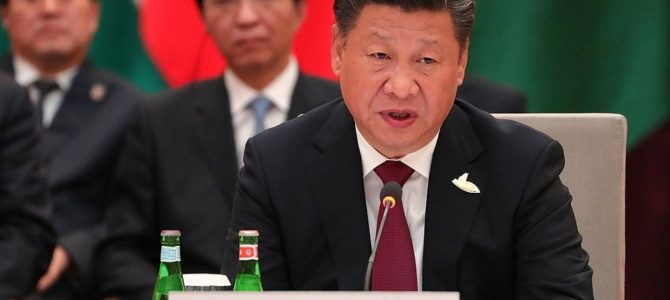
For many Americans who have no memory of the Cold War, which means anyone under 35, it is difficult to view the United Sates as a just and moral superpower. Those of us longer in the tooth grew up, almost universally, with that idea. In significant ways it was the Cold War, and our antagonistic rivalry with the Soviet Union, that convinced Americans of their country’s moral superiority. To be sure, the United Sates did some bad things, but in furtherance of a fight against an “evil empire” with a vision for the world we could not tolerate. Today, we have no such rival. Or do we?
The most powerful emerging superpower in the world is China. While always nominally viewed as a communist adversary, our relationship with China has never had the ferocity or high stakes that our decades-long battles with Russia did. Americans do not see China as an oppressive and dangerous regime that threatens democracy and freedom in the world. This is a mistake, and one we should quickly correct.
The list of China’s crimes is long. But a few highlights put its atrocities in stark relief. Need we look any further than the million Uighurs, a Muslim minority in Western China who are currently in concentration camps? Can we hear the accounts of torture like the one below (warning: it’s hard to watch) without understanding that China must be a foe and not a partner?
"I begged them to kill me." Uighur woman testifies before Congress on torture in Chinese internment camps https://t.co/9GE9g4tInA pic.twitter.com/dkwKX4l8Tk
— TIME (@TIME) November 30, 2018
Chinese citizens lucky enough not be tortured in concentration camps are now beginning to be monitored online, their accounts scoured for social and anti-social behavior. The “well-behaved” will be awarded with perks like the ability to freely travel, the “badly behaved” punished with repressive measures. These are exactly the kind of authoritarian measures that Americans decried in the Soviet Union and that gave us our sense being the good guys. Yet that phenomenon does not seem to be occurring in regard to China.
Who Do We Compare Ourselves To?
Francis Fukayama’s essay “The End Of History,” penned at the dawn of the post-Cold War era, got a lot of things wrong. But it did get something essential right. Since 1988, the United States has been the hegemonic superpower in the world. For young Americans, there has never been anything to compare the United States to, other than itself.
The result of this introspection has not been entirely healthy. In fact, for far too many of our citizens it has led to a moral relativism rooted in the idea that the United States is basically just as bad as everyone else. Well, we aren’t. Not by a long shot. The United States is not slipping into authoritarian fascism. How do we know this? We know it because China has real authoritarian fascism, and it looks nothing like our society.
A good number of Americans have become so comfortable with self loathing, our racist history, our bellicosity around the globe, and our sometimes unseemly president that they don’t see that if China continues to go unchecked, if it is allowed to expand its power in the Middle East, Africa, and elsewhere, the American values of democracy, liberty, and freedom may face an existential threat just as they did during the Cold War.
Being a Superpower Is Hard
History shows us that it is not easy to be a superpower. Marshaling the levers of power — government, the military, the economy, and diplomacy — is a herculean task. This is why comparing our country to supposedly paradisiacal Scandinavian states is silly. The true miracle of the United States is not our freedom, but that free men can create a nation with so much power and influence.
In some ways it is vastly easier for repressive regimes like China to amass and project power. They don’t have pesky voters tossing monkey wrenches into the elites’ well-oiled machines every few years. They don’t have a free press constantly reminding their citizens how much their government sucks. They don’t have due process tying a hand behind the back of their law enforcement.
In all three of these areas — voting, freedom of the press, and policing — some Americans have convinced themselves that we are on the precipice of disaster. Frankly, it’s stuff and nonsense. Abuses of power occur in every government on earth, and the United States is no exception, but it is important that we see our faults in a broader context. Right now, China is that context.
Our Vision for the World Is Better
An amazing thing about America is that our constant churning debates about how to achieve our goals have usually addressed a common set of goals. We differ on how best to further freedom, democracy, equality, and individual rights, but most of us agree they are phenomena devoutly to be wished for. In looking at China, we should see what we are not, and in so seeing understand what we are.
Contrary to the experience of young Americans, hegemonic superpowers don’t tend to stay hegemonic for long. Rivals emerge with new visions for global order. China’s vision is every bit as dark and despicable as the Soviet Union’s was. It is not overly self-congratulatory to acknowledge that our vision is vastly superior.
If we can’t do that, if we can’t accept that we really do have the superior vision for the world, then we cannot execute that vision. Look to China. See what we must never become and accept that maybe, just maybe, we really are the good guys.









